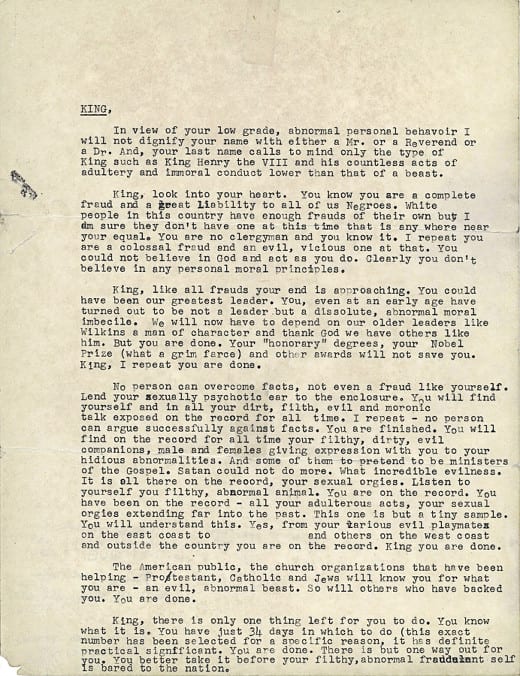Did you know that the FBI wasn’t the first major law enforcement arm of the federal government, nor was it always the most important? In fact, the Postal Inspection Service is the oldest American federal law enforcement agency; it can trace its roots back to 1772.
The FBI didn’t bust onto the scene until 1908 (back then it was just the “Bureau of Investigation”), and it didn’t really come into it’s own until the 48-year tenure of its infamous director J. Edgar Hoover, which ran from 1924 until 1972.
Unlike most law enforcement, the FBI has extremely broad jurisdiction, which allows it to be effective across state lines and in investigating complex financial and delicate political crimes. Of course most of us know this because the FBI is very much in the news these days, and has been ever since the 2016 election.
But let’s talk about some less well known FBI investigations, shall we?
1. The FBI tormented Dr. Martin Luther King, Jr.

Photo Credit: Public Domain
After Martin Luther King Jr. gave his “I have a dream” speech, the FBI considered him the most dangerous and effective leader of the civil rights movement. The FBI, and J. Edgar Hoover in particular, made it their mission to ‘deal’ with King, so they tapped his phones, and painted him as a Communist and a sexual deviant. Hoover hated King so much that he tried to convince King to commit suicide.
Photo Credit: lettersofnote.com
In 1964, one year after King’s famous speech, he received an anonymous threatening letter in the mail (it came from the FBI) along with a cassette tape of allegedly incriminating recordings of Dr. King in hotel rooms with various women. The cassette was the fruit of nearly a year of surveillance, and the note intimated, in terms that a 1976 congressional investigation found to be not uncertain, that King should commit suicide.
Here is a selection:
King, there is only one thing left for you to do. You know what it is…You are done. There is but one way out for you. You better take it before your filthy, abnormal fraudulent self is bared to the nation.
2. The FBI investigated a fictional anti-goth cult for 2 years.
The cult was called “The Church of the Hammer”, supposedly founded by a former member of the Westboro Baptist Church. The FBI started its investigation into the organization in 2005.
The investigation didn’t have much to go off of at the beginning – the whole thing was based off of an interaction a goth person had online with the groups Yahoo Group, “GodHatesGoths”. The goth was arguing with the group, trying to convince them that the goth subculture was unfairly maligned, and did not actually necessarily worship Satan.

Photo Credit: Muckrock.com
But the group was apparently unpersuaded, and in the postings they had made some pretty significant threats:

Photo Credit: Muckrock.com
The FBI was worried, and so they started to contact law enforcement and witnesses from the various incidents the group had allegedly been involved in, according to their postings – but investigators couldn’t find anything.
Finally, over two years later, they went to the actual website, godhatesgoths.com. There, they found…

Photo Credit: Muckrock.com
And the investigation was closed.
3. The FBI nailed its most-wanted cybercriminal because the guy’s password was his cat’s name + 123.

Photo Credit: FreeJeremy.net, CC BY-SA 3.0
Jeremy Hammond was perched atop the FBI’s list.
He was an excellent black hat hacker, and, as he said,
“From the start, I always wanted to target government websites, but also police and corporations that profit off government contracts…I hacked lots of dot-govs.”
He worked as a hacktivist with Anonymous, and he successfully hacked a number of different corporations and government websites. Then, one day, his luck ran out.
In 2012 he was arrested, and 2014 he copped to a plea deal for 10 years in jail.
When his house was raided, Hammond’s first thought was to close his computer, so it would be password protected. But the government cracked it. Again, in Hammond’s own words,
“My password was really weak…[my cat’s name] Chewy. Chewy 123.”
4. The FBI does not always get their man…or find the missing airplane.
In 2003, only 2 years after 9/11, a 727 airplane took off from the capital of Angola, Luanda.
Only two men are known to have been on the plane (a 727 usually takes 3 people to fly), and while one was a trained pilot, he was licensed only for much smaller private craft.

The type of aircraft stolen
Photo Credit: RuthAS, CC BY 3.0
Ben Charles Padilla and his recently hired helper, John Mikel Mutantu, did not communicate with the tower while taxiing jerkily onto a runway, and taking off.
Though there was a frantic search for the plane, involving the FBI and investigative agencies both American and from around the world, it was never seen again, nor were its occupants.
The FBI quietly closed its investigation two years later, in 2005, and there has been no significant public comment on the case since then.
The post 4 Strange and Thought-Provoking FBI Investigations appeared first on UberFacts.



